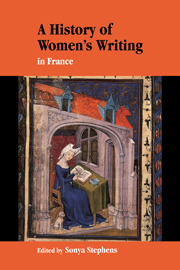Book contents
- Frontmatter
- Contents
- Notes on contributors
- Introduction
- 1 Female voices in convents, courts and households: the French Middle Ages
- 2 To choose ink and pen: French Renaissance women's writing
- 3 Altering the fabric of history: women's participation in the classical age
- 4 The eighteenth century: women writing, women learning
- 5 Eighteenth-century women novelists: genre and gender
- 6 The nineteenth century: shaping women
- 7 1900–1969: writing the void
- 8 From order to adventure: women's fiction since 1970
- 9 Changing the script: women writers and the rise of autobiography
- 10 Women poets of the twentieth century
- 11 Voicing the feminine: French women playwrights of the twentieth century
- 12 Feminist literary theory
- Bibliographies
- Index
9 - Changing the script: women writers and the rise of autobiography
Published online by Cambridge University Press: 25 September 2009
- Frontmatter
- Contents
- Notes on contributors
- Introduction
- 1 Female voices in convents, courts and households: the French Middle Ages
- 2 To choose ink and pen: French Renaissance women's writing
- 3 Altering the fabric of history: women's participation in the classical age
- 4 The eighteenth century: women writing, women learning
- 5 Eighteenth-century women novelists: genre and gender
- 6 The nineteenth century: shaping women
- 7 1900–1969: writing the void
- 8 From order to adventure: women's fiction since 1970
- 9 Changing the script: women writers and the rise of autobiography
- 10 Women poets of the twentieth century
- 11 Voicing the feminine: French women playwrights of the twentieth century
- 12 Feminist literary theory
- Bibliographies
- Index
Summary
The early 1980s saw the publication of four important works of autobiography by women writers. Enfance by Nathalie Sarraute (1983), and L'Amant (1984) by Marguerite Duras, came from the pens of established novelists at the peak of their careers. La Place (1983) by Annie Ernaux, and L'Amour, la fantasia, by Assia Djebar (1985) were by younger writers for whom the switch to autobiography would represent a decisive point in their evolution. Published within a brief space of time, these texts marked a crucial moment in the development of both autobiography and women's writing in France. From this point on autobiography has been at the centre of a number of important currents in French literature and culture, and the contribution of women writers to this domain has been considerable. This moment is, then, a vantage point from which to look back at women's autobiography in the earlier part of the twentieth century, and forwards to more recent developments in autobiographical writing, where Ernaux and Djebar, along with other women writers, have continued to be prominent.
Sarraute (1900–99) and Duras had both been linked with the nouveau roman movement. Their motive in turning to autobiography was not the conventional one of seeking to record a life for posterity, nor did it involve abandoning or breaking stylistically with their earlier creative work.
- Type
- Chapter
- Information
- A History of Women's Writing in France , pp. 185 - 203Publisher: Cambridge University PressPrint publication year: 2000



